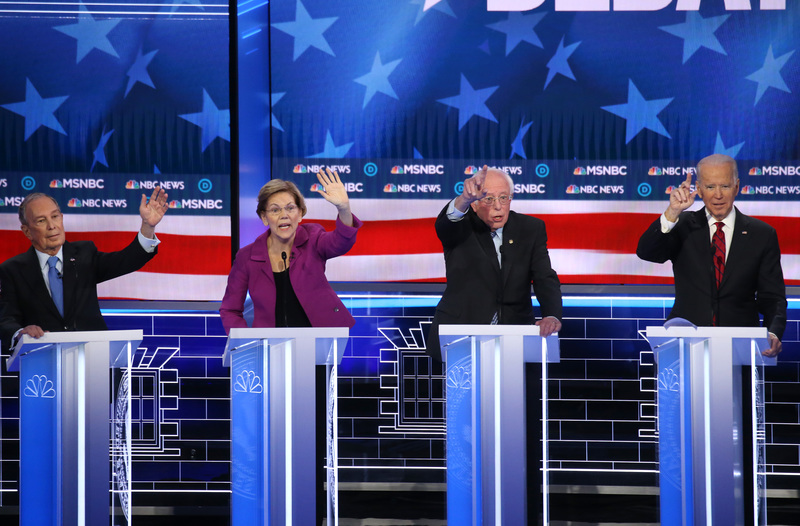By John Harrington I
The fight for the Democratic nomination for the presidency in 2020 included a very interesting and diverse race. The initial field was massive, including young startups Mayor Pete Buttigieg and Andrew Yang, experienced moderates Joe Biden and Amy Klobuchar, progressives Bernie Sanders and Elizabeth Warren, tenacious representative Tulsi Gabbard, along with a full cast of relatively minor players who dropped out along the way. Perhaps the most notable pairing in this array were the two billionaires, businessman Tom Steyer and former New York City Mayor Michael Bloomberg.

If you had been watching any TV in the two months or so before the primaries, you surely would have seen an astronomical number of political commercials by each of these last two men. They had been hemorrhaging chunks of their personal fortunes to make a face for themselves among the crowded field on the national stage, with Steyer spending $300,000,000, and Bloomberg more than $1,000,000,000, according to the FEC.
Many accused the rich candidates of attempting to buy the election, instead of sustaining an effort to win over the voters with policies and ideas, and they certainly were handicapped in building personal connections with constituents.
These tactics have drawn criticism. Many accused the rich candidates of attempting to buy the election, instead of sustaining an effort to win over the voters with policies and ideas, and they certainly were handicapped in building personal connections with constituents. Because Bloomberg was not accepting any direct donations from supporters, he voluntarily opted out of consideration to qualify for the first few Democratic debates, until the rules were changed in his favor. Moreover, many Democratic voters arrived at the conclusion that business leaders are not necessarily fit to lead a country, based on their opinions on the current president.
Further conflict stems from other sources of funding and their respective influence on the campaign. Warren and Sanders have sworn off special treatment and private events for big-money donors, whereas Buttigieg and Biden have been holding closed-door meetings with large donors, attracting contributions from dozens of billionaires. This contradistinction in ideologies became clear during the December debate, when Warren called out Buttigieg for a private fundraising event in a “wine cave.” Warren argued that the government already works extremely well for the wealthy and well-connected, and that we need a president who can stand up for the interests of most people, especially if it means opposing billionaires, corporate lobbyists, and healthcare executives who were able to dissuade Pete from his previous commitment to universal health care. Buttigieg countered that Democrats need to exhaust all possible donors and resources in order to match the funding machine holding up Trump.
As we have seen with the infamous case of Gordon Sondland, money can be a direct path to political power.
But is the mayor’s strategy the most effective? Not according to the numbers. Although he does boast successful fundraising, he is still lagging behind the two candidates who reject his philosophy. Sanders and Warren accumulated $109 and $82 million respectively, compared to Buttigieg’s $77 million, before the Iowa Caucuses. Another potential issue with appealing to wealthy donors is corruption in administration appointees. As we have seen with the infamous case of Gordon Sondland, money can be a direct path to political power. After giving at least one million dollars to Trump’s inauguration committee, Sondland was appointed to the role of Ambassador to the European Union. Now, he is not only under scrutiny for any connections he may have to the offenses over which the president was impeached, but also for an unfair method of becoming a public servant.
The billionaires’ money did not translate to votes. Steyer dropped out even before Super Tuesday, without winning any delegates, and Bloomberg ended up competing in only one day of voting, winning only American Samoa. Now that Biden has captured the nomination, it is unlikely that much will improve significantly in the way politics can happen, but it will be interesting to see how long these traditional ideas hold out in future national elections.
![]()

Unfortunately, real-life decisions don’t garner votes; it’s the exciting ideas that do. It’s much more exciting to hear about free healthcare and college, especially for the young, and I don’t blame them for that. However, candidates that have to take a more moderate tack can’t do this because they are essentially outshouted by the populist, idealist voices who promise the good things without any repercussions. The more center, realist candidates can’t, therefore, afford to not go to these big fundraisers and be somewhat influenced by these big donors, which is a shame. Also, it’s worth mentioning that Pete Buttigieg was attacked for his “wine cave” fundraisers despite being one of the more lower-income fundraisers – most of the other candidates on the debate stage had some sort of fortune to draw from as well.